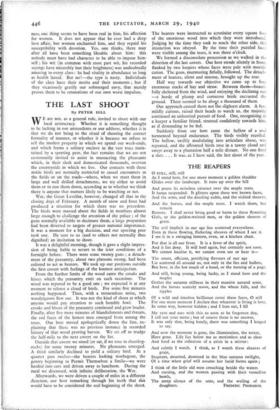THE LAST SHOOT
By PETER HILL
WE are not, as a general rule, invited to shoot with our local aristocracy. Whether it is something thought to be lacking in our antecedents or our address, whether it is that we do not bring to the ritual of shooting the correct formality of manner, or whether it is because we refuse to sell the modest property in which we spend our week-ends, and which forms a solitary enclave in the vast tract main- tained by a sporting p6er, the fact remains that we are not customarily invited to assist in massacring the pheasants which, in their sleek and domesticated thousands, overrun the countryside in which we live. Our contacts with these noble birds are normally restricted to casual encounters in the fields or on the roads—where, when we meet them in large and well drilled detachments, we try either to avoid them or to run them down, according as to whether we think there is anyone that matters likely to be watching or not.
War, the Great Leveller, however, changed all that in the closing days of February. A month of snow and frost had produced a situation for which there was no precedent. The birds were massed about the fields in numbers almost large enough to challenge the attention of the police ; of the guns normally available to decimate them, a large proportion had been diverted to targets of greater national importance. It was a moment for a big decision, and our sporting peer took one. He sent to us (and to others not normally thus dignified) an invitation to shoot.
It was a delightful morning, though it gave a slight impres- sion of being liable to revert to the icier conditions of a fortnight before. There were some twenty guns ; a detach- ment of the peasantry, about two platoons strong, had been enlisted to act as beaters. We took up our positions outside the first covert with feelings of the keenest anticipation.
From the further limits of the wood came the croaks and hisses which the peasantry emit on such occasions. The wood was reputed to be a good one ; we expected it at any moment to release a cloud of birds. For some five minutes nothing happened. Then, with a tremendous noise, two woodpigeons flew out. It was not the kind of shoot at which anyone would pay attention to such humble fowl. The croaks and hisses of the peasantry continued and grew louder. Finally, after five more minutes of blandishments and threats, the red faces of the honest men emerged from among the trees. Our host moved apologetically down the line, ex- plaining that there was no previous instance in recorded history of that wood proving barren. We set off to trudge the half-mile to the next covert on the list.
Outside that covert we stood (or sat, if we rose to shooting- sticks) for some twenty minutes. No pheasants emerged. A third similarly declined to yield a solitary bird. At a quarter past twelve—the beaters looking woebegone, the gentry beginning to Permit Themselves a Smile—we were herded into cars and driven away to luncheon. During the meal we discussed, with infinite deliberation, the War.
Afterwards, we were driven a couple of miles in a different direction, our host remarking through his teeth that this would have to be considered the real beginning of the shoot. The beaters were instructed to scrutinise every square foot of the enormous wood into which they were introduced. Judging by the time they took to reach the other side, this injunction was obeyed. By the time their puzzled faces were visible among the trees, it was three o'clock.
We formed a disconsolate procession as we walked in the direction of the last covert. Our host strode silently in front, flanked by two keepers whose faces were pale with mortifi- cation. The guns, murmuring fitfully, followed. The detach- ment of beaters, silent and morose, brought up the rear.
Half way towards our objective we came up to four enormous stacks of hay and straw. Between them.—beauti- fully sheltered from the wind, and enjoying the declining sun —a horde of plump and comatose birds encrusted the ground. There seemed to be about a thousand of them. Our approach caused them not The slightest alarm. A few, mildly curious, raised their heads to watch us, the majority continued an unhurried pursuit of food. One, recognising in a keeper a familiar friend, strutted confidently towards him, as if demanding to be fed.
Suddenly from our host came the bellow of a soul tormented beyond endurance. The birds visibly recoiled. The bellow, swiftly modulating into articulate abuse, was repeated, and the affronted birds rose in a tawny cloud and swept away to a plantation half a mile distant. No one fired a shot. . . . It was, as I have said, the last shoot of the year.


































 Previous page
Previous page